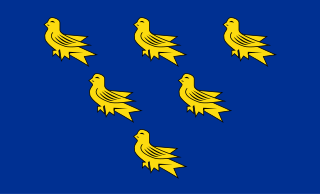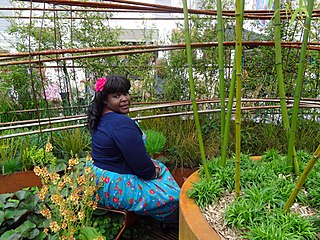Related Research Articles

The University of Sussex is a public research university located in Falmer, Sussex, England. Its campus is surrounded by the South Downs National Park and it is a short distance away from central Brighton. The University received its Royal Charter in August 1961, the first of the plate glass university generation, and was a founding member of the 1994 Group of research-intensive universities.

Sussex, from the Old English Sūþsēaxe, is a historic county in South East England corresponding roughly in area to the ancient Kingdom of Sussex. It is bounded to the west by Hampshire, north by Surrey, northeast by Kent, south by the English Channel, and divided for many purposes into the ceremonial counties of West Sussex and East Sussex. Brighton and Hove, though part of East Sussex, was made a unitary authority in 1997, and as such, is administered independently of the rest of East Sussex. Brighton and Hove was granted City status in 2000. Until then, Chichester was Sussex's only city.

Brighton is a seaside resort in the county of East Sussex. It is a constituent part of the city of Brighton and Hove, created from the formerly separate towns of Brighton and Hove. Brighton is located on the south coast of England, positioned 47 miles (76 km) south of London.
The University of Brighton is a public university based on four campuses in Brighton and Eastbourne on the south coast of England. Its roots can be traced back to 1858 when the Brighton School of Art was opened in the Royal Pavilion. It achieved university status in 1992.
Mass-Observation was a United Kingdom social research organisation founded in 1937. Their work ended in the mid-1960s but was revived in 1981. The Archive is housed at the University of Sussex.
Charles Henry Madge, was an English poet, journalist and sociologist, now most remembered as a founder of Mass-Observation.
Major Tom Harnett Harrisson, DSO OBE was a British polymath. In the course of his life he was an ornithologist, explorer, journalist, broadcaster, soldier, guerrilla, ethnologist, museum curator, archaeologist, documentarian, film-maker, conservationist and writer. Although often described as an anthropologist, and sometimes referred to as the "Barefoot Anthropologist", his degree studies at University of Cambridge, before he left to live in Oxford, were in natural sciences. He was a founder of the social observation organisation Mass-Observation. He conducted ornithological and anthropological research in Sarawak (1932) and the New Hebrides (1933–35), spent much of his life in Borneo and finished up in the US, the UK and France, before dying in a road accident in Thailand.
Margaret Ann Boden, OBE, ScD, FBA is a Research Professor of Cognitive Science in the Department of Informatics at the University of Sussex, where her work embraces the fields of artificial intelligence, psychology, philosophy, and cognitive and computer science.
Housewife, 49 is a 2006 television film based on the wartime diaries of Nella Last. Written by and starring English actress and comedian Victoria Wood, it follows the experiences of an ordinary housewife and mother in the Northern English town of Barrow-in-Furness, Lancashire, during the Second World War. It was first broadcast in the UK by ITV on 10 December 2006.

The Hall–Carpenter Archives, founded in 1982, are the largest source for the study of gay activism in Britain, following the publication of the Wolfenden Report in 1957. The archives are named after the authors Marguerite Radclyffe Hall (1880–1943) and Edward Carpenter (1844–1929). They are housed at the London School of Economics, at Bishopsgate Library –, and in the British Library.
Penelope Anne "Penny" Sparke is a British writer and academic specialising in the history of design. She has been Professor of Design History at Kingston University, London, since 1999, where she is also Director of the Modern Interiors Research Centre.
Dorothy Mary Owen,, néeWilliamson was an English archivist and historian.

Margaret Ebunoluwa Aderin-Pocock is a British space scientist and science educator. She is an honorary research associate in University College London's department of physics and astronomy. Since February 2014, she has co-presented the long-running astronomy television programme The Sky at Night with Chris Lintott.
David Alan Mellor is a British curator, professor and writer. He has been awarded the Royal Photographic Society's J. Dudley Johnston Award and Education Award.

The Keep is a purpose built archive and historical resource centre which stores, conserves and gives the public access to the records of its three managing partners: The East Sussex Record Office, The University of Sussex Special Collections, and the Royal Pavilion and Museums Local History Collections. The Keep also houses the library and office of The Sussex Family History Group, functions as headquarters of Friends of The Keep Archives, and holds the Historic Environment Record database for East Sussex. From November 2018, it has also functioned as the South East Hub for the Unlocking Our Sound Heritage project for The British Library. It was funded by East Sussex County Council, the City Council of neighbouring Brighton and Hove and the University of Sussex, and was built on land close to the University in the Moulsecoomb area of Brighton and Hove. The building, constructed with a budget of £19 million, opened on 31 October 2013, superseding the former East Sussex Record Office in the county town of Lewes.
Professor Dame Lesley Jean Fallowfield DBE is a British cancer psychologist and a professor of psycho-oncology at the University of Sussex. The main outcomes of her research have been the establishment of assessment tools to measure quality of life in clinical trials of cancer patients and the design of educational programmes to improve oncologists' communication with their patients.

Phyllis Mander-Jones MBE was an Australian born librarian and archivist who helped establish the archival profession in Australia.
Dennis Chapman (1911–2003) was a social psychologist best known for his book The Home and Social Status, published in 1955, which investigated the British working class domesticity in the mid-twentieth century. His research focuses mainly on two primary aspects of society: domestic housing and provision, and the sociology of crime.
Becky Parker MInstP MBE is a British physicist and physics teacher based in Kent. She is a Visiting Professor at School of Physics and Astronomy, Queen Mary University of London.
Claire Breay, MBE is an English manuscript curator and medieval historian. She is the Head of Ancient, Medieval and Early Modern Manuscripts at the British Library, where she specializes in Western medieval manuscripts in the Department of Collections.
References
- 1 2 3 4 Arnot, Chris (2007-06-02). "The archivist Dorothy Sheridan: Come file with me". The Guardian. ISSN 0261-3077 . Retrieved 2017-10-03.
- 1 2 3 "50 Years: Dorothy Sherdian". University of Sussex. 2011.
- 1 2 3 Dennett, Melita. "Meet QueenSpark Books' patron Dorothy Sheridan". QueenSpark Books. Retrieved 3 October 2017.
- ↑ Williams, Joe. "Memories and reflections - Dorothy Sheridan and Lucy Noakes in conversation". www.massobs.org.uk. Retrieved 2017-10-03.
- ↑ "Mass Observation Project". Mass Observation. Mass Observation. Retrieved 3 October 2017.
- 1 2 3 4 "Dorothy Sheridan MBE". University of Brighton: Arts and Culture. Retrieved 2017-10-03.
- ↑ Sheridan, Dorothy. "The Mass Observation Archive: A History". Mass Observation Online. Adam Matthew Digital. Retrieved 3 October 2017.
- ↑ "National Life Stories". The British Library. Retrieved 3 October 2017.
- ↑ "Observing the 80s". University of Sussex Blogs. University of Sussex. Retrieved 3 October 2017.
- ↑ "People: Centre for the History of War and Society : University of Sussex". University of Sussex. Retrieved 3 October 2017.